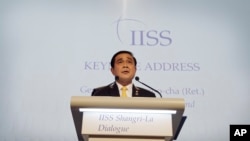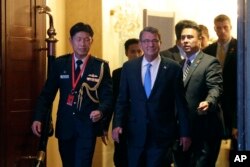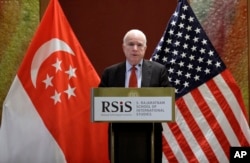The head of Thailand’s military-dominated junta, Prayuth Chan-ocha has defended seizing power two years ago to avoid further unrest “or even civil war.”
Prayuth, who, as army commander-in-chief, led a bloodless coup in May 2014 and has since become prime minister, Friday told those attending a regional security summit, “I can assure you that Thailand will return to democracy.”
The military takeover, which ousted a weakened civilian government, was needed “to put the country on the track of reform” and prevent further damage to the economy of the kingdom which “had lost equilibrium.”
The junta remains in power at a time of continuing concern about the health of highly-revered King Bhumibol, who at 88, is the world's longest reigning monarch. He has spent nearly all of his recent years in a Bangkok hospital.
Rebutting international criticism of the junta’s sweeping power and clamping down on civil liberties, Prayuth said, “We do not have any intention to violate human rights ...all of our measures have been based on the rule of law.”
Overseen by the junta, a new constitution has been drafted and is to be voted on by the people in August, but debate about the charter – criticized across the domestic political spectrum – is muzzled.
Prayuth recently stated that a rejection of the constitution would delay elections for a new government and that he might have to remain in power “despite how much you hate me.”
Thailand, a reliable U.S. military ally during the Cold War era and Vietnam War, under the current military junta, has had warming security and trade ties with both China and Russia following Washington’s criticism of the coup and its explicit concerns about repression of rights and the lack of a quick restoration of democracy.
Thailand and other small and medium-sized countries are “avoiding the trap of having to choose sides,” said Prayuth.
His speech at the opening dinner of the gathering, better known as the Shangri-La Dialogue, is a prelude to the annual main event here, the sometimes acrimonious exchanges between senior military officials of the United States and China.
Official delegations, security analysts and academics from more than 50 countries on Saturday will parse the remarks of U.S. Defense Secretary Ash Carter and Admiral Sun Jianguo, deputy chief of the general staff of the People’s Liberation Army, or PLA, about China’s militarization of the disputed islets in the South China Sea.
Sun, who is in charge of international relations for the PLA, on Friday was said to have met separately with security officials from eight nations ahead of the Asia Security Summit.
The talks come amid increasing nervousness among most ASEAN members about what is perceived as increasingly aggressive actions and militarization of the Paracels and Spratlys.
The moves have been seen as the primary catalysts for the Vietnamese and the Americans – former enemies – to bridge closer security ties, underscored by U.S. President Barack Obama’s visit last month to Vietnam, which also has conflicting maritime territorial claims with China.
Beijing accuses the United States of militarizing the South China Sea with its increasing “freedom of navigation” passages in the sea and overflights.
This conference in Singapore comes just ahead of an international arbitration ruling on the Philippines’ claims against China’s maritime claims.
Beijing has already indicated it will not abide by The Hague tribunal’s findings and regards the process as illegitimate.
An influential U.S. lawmaker, Republican Senator John McCain, who chairs the Senate’s Armed Services Committee, said in Singapore on Friday that there could be consequences should Beijing make good on its threat to reject the U.N. court ruling.
The senator urged states in the region to back Washington’s statements that The Hague’s findings should be binding.
“America and the world are counting on the nations of Southeast Asia to recommit their power and resolve to upholding this system on which our shared security and prosperity depend,” McCain said in a speech at Nanyang Technological University.
International lawyers do not expect the tribunal to actually rule on the legality of the Chinese “nine-dash line” encompassing the major part of the South China Sea claimed by Beijing, said Carl Thayer, emeritus professor of politics at the University of New South Wales.
Thayer, at the Shangri-La Dialogue, in response to a query from VOA News about concerns China is poised to declare an “air defense identification zone” (ADIZ) in the South China Sea, said, “There’s no capability for China to carry it out ...they’re just playing mind games.”
An ADIZ is an area, publicly announced, extending beyond national territory where unidentified aircraft face interrogation via radio and could be intercepted for identification prior to crossing into sovereign airspace.
In 2013, China imposed an ADIZ in the East China Sea covering Japanese-controlled islands, known as Senkaku in Japanese and Diaoyu in Chinese.















